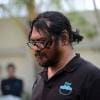Medical facilities stretched to limit
In Kutupalong camp 1, Nasima Khatun, nearly 70 years old, is being carried using a unique device fashioned out of a bamboo stick and a lungi. From a distance, only her leg is visible, poking out from the lungi.
Her son, Salimullah, and his nephew, Mahmud Rashid, are her stretcher-bearers.
Arriving from Shilkhali in Myanmar 10 days ago, the family recently made a camp here. Deteriorating health and with no stretchers in sight have now compelled them to transport their mother using this apparatus.
"My mother is ill; she has high fever. We are now taking her to the medical camp nearby," Salimullah says.
The medical camp in question is located around a kilometer away, making it difficult for her to walk the whole way.
The rains have also resulted in devastating the muddy path, the only way to and from the camp. Now the unpaved roads have become difficult to negotiate, accumulating almost six to ten inches of mud.
With a government directive ordering all roads to be delivered directly to camps, oncoming trucks, along with the thousands of people walking on it all day, are breaking the roads even further.
Nasima, though, isn't the only one suffering. There are many others like her. The growing number of people needing medical care is growing every day.
Dr Jamshedul Haque, a medical officer at Cox's Bazar Civil Surgeon office said that camps and medical teams are working around the clock to deal with the ongoing crisis.
"In Ukhia upazila we have 21 medical teams and 15 more in Teknaf. They are made up by both government and non-government organisations," he said.
In Ukhia, eight of the teams are formed by the government and six in Teknaf.
The main targets of these medical teams are children from the ages 0-15. They plan on providing Vitamin A capsules, polio and rubella vaccines to 1,13,000 children.
Many children are showing signs of pneumonia and skin disease. With nothing but muddy wet ground to sleep, these diseases are increasing. More worryingly, lack of food has also meant lower production of breast milk for nursing mothers, meaning a fall in nutrition intake for children.
When queried on the kind of service for pregnant women, Jamshed said there were currently two maternity wards especially set up for Rohingya women in two upazila health complexes. Those in serious conditions are usually sent there and may be referred elsewhere as needed.
A couple of days ago, UNB reported that Health Minister Mohammad Nasim said some 70,000 women out of the Rohingya people who have taken shelter in Bangladesh in the face of persecution by Myanmar forces in Rakhine State are pregnant.
According to Coast Trust, a local NGO, 120 babies have been born in no-man's land. Alarmingly, an aid worker for the organisation added that many women are opting for home birth over visiting distant medical centres.
In a local upazila complex, 78 children have already been born.
But health may not be a priority for the refugees. An aid worker said that the rain and the mud has meant many refugees have lost their shelters and are now looking for a home and food, forgoing healthcare.
A woman, Hazera, in Kutupalong camp 1, is one of them.
"My children are sick. But we are not looking for medicine. We need food first," she says. She has three children with her and they all have fever.
She wraps her arms around them and then begins to sob.
Underling the overwhelming number of people needing care, an officer at Coast Trust informed that the organisation dealt with over 4,000 patients in one day.
Since they began operations on the 8th of September, Coast Trust has received an astounding 31,208 patients. Since yesterday, most of the patients have come with back ache, sore throat, pneumonia and diarrhoea. The prevalence of diarrhoea is most among the children.
"We are trying our very best to ensure the provision of the best healthcare for the refugees," the Directorate General of health, Dr Mohammad Abul Kalam, said.
"We want to increase our services but we do not have enough doctors. Doctors don't want to leave their posts and come here," said Rezaul Karim Chowdhury, executive director of Coast Trust.
In Cox's Bazar Sadar Upazila Hospital, the condition is worsening.
"We have a 250 bed capacity but there are more than 500 patients. Of that, we now have 100 beds are occupied by Rohingya patients in two blocks bearing serious injuries such as cuts, bullet wounds, broken legs etc; one block is for males and another for females. But we are steadily getting overburdened," Superintendent of the hospital, Dr Puwsonw said.
He added that the serious nature of the injuries mean they need a lot of attention.

 For all latest news, follow The Daily Star's Google News channel.
For all latest news, follow The Daily Star's Google News channel.
Comments